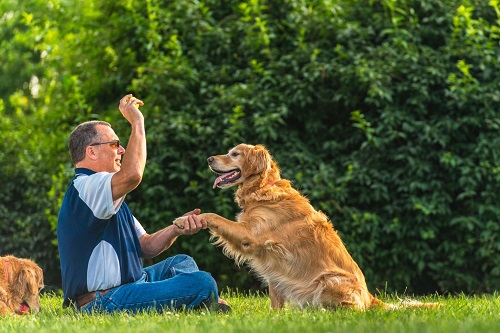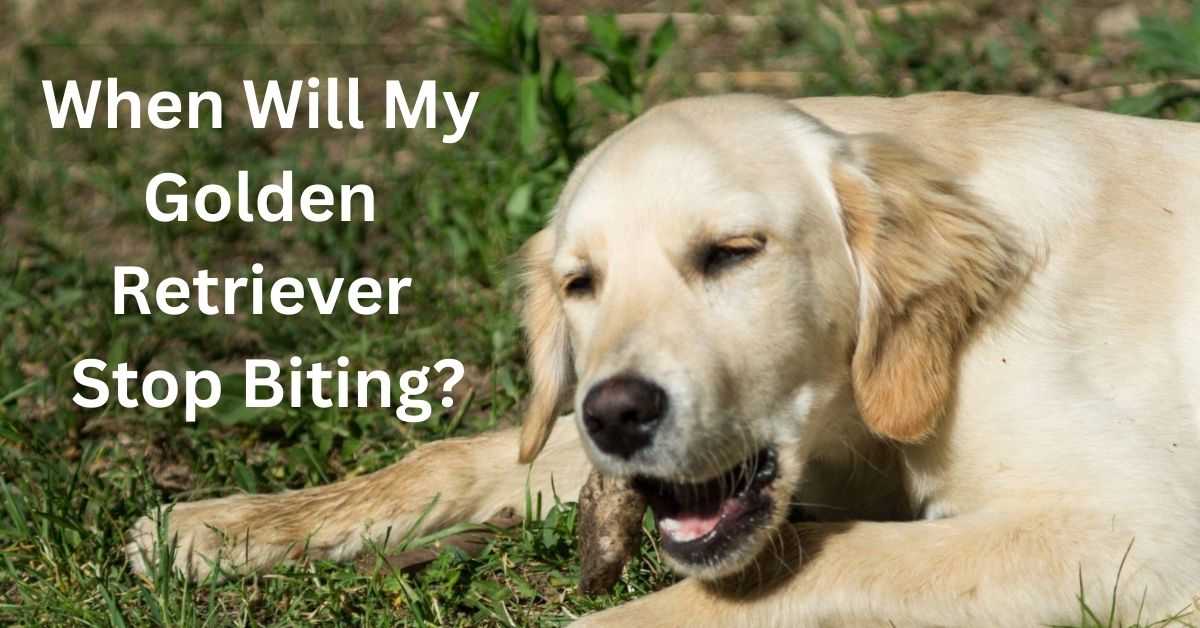Welcoming a Golden Retriever puppy into your home is an exciting and rewarding experience. However, as cute as those tiny teeth may be, the biting phase is a natural part of a puppy’s growth and development. Today we will learn When Do Golden Retrievers Stop Biting, also we will try to understand why puppies bite.
When Do Golden Retrievers Stop Biting?
As your puppy matures, the biting intensity usually decreases. Signs of improvement include gentler bites and more self-control. During this phase, patience and consistency are essential.
Understanding Why Puppies Bite
Puppies, including Golden Retrievers, bite for various reasons:
- Teething can cause discomfort, making them instinctively want to chew on objects, including your hands.
- Puppies use their mouths to explore the world around them, much like human babies use their hands.
- Biting is a form of play and social learning among littermates.
Stages of Puppy Development and Biting
The Teething Phase
How long does the teething phase last, and what discomfort does it cause? The teething phase typically spans from 3 to 6 months of age. During this period, puppies experience discomfort as their baby teeth fall out, making way for adult teeth. Biting and chewing help alleviate the soreness in their gums.
What are the signs of teething, and how can you alleviate their biting tendencies during this phase? Signs of teething include excessive drooling, chewing on objects, and increased biting. Providing appropriate chew toys and frozen items can soothe their gums, redirecting their biting behaviour from their hands and furniture.
Socialization and Training Phase
The Role of Socialization in Biting Early socialization plays a pivotal role in shaping a puppy’s behaviour. Exposing them to various people, animals, and environments reduces the likelihood of fear-based aggression and biting later in life.
Training Techniques for Biting Positive reinforcement is a potent tool for modifying biting behaviour. Rewarding non-biting interactions with treats and praise reinforces desired behaviour, while time-outs and redirection provide clear cues about what’s acceptable.
When Will the Biting Subside?
Transition to Adolescence
Behavioural Changes in Adolescence Around 5 to 6 months, you’ll notice changes as your Golden Retriever enters adolescence. Hormonal shifts lead to a calmer disposition, and you’ll likely observe a reduction in biting incidents.
Addressing Residual Biting While the adolescent phase brings fewer biting episodes, some residual tendencies might persist. Continued consistent training and rewards for non-biting behaviour further reinforce their understanding of boundaries.
Adult Behavior and Biting
Biting Triggers in Adult Golden Retrievers Understanding biting triggers, such as fear, aggression, pain, or a perceived threat, is essential. Recognizing these triggers empowers you to prevent and manage biting incidents effectively.
Dealing with Occasional Biting in Adults As your Golden Retriever matures, biting should become a rare occurrence. However, if occasional biting incidents do arise, it’s crucial to address the underlying causes rather than the behaviour itself.
Tips for Minimizing Biting
Proper Chew Toy Introduction
Importance of Chew Toys Chew toys serves as essential tools for managing biting tendencies. Introducing a variety of textures and materials helps fulfil their need to chew while deterring destructive behaviours.
Types of Chew Toys Different stages of development require different chew toys. Soft toys are suitable for teething, while more durable options cater to adult teeth. Tailoring the toys to their needs ensures effective biting control.
Consistent Training
Establishing Consistency Consistency in your approach to training is pivotal. By setting clear expectations and reinforcing non-biting behaviour consistently, you provide a structured environment for your Golden Retriever’s growth.
Positive Reinforcement Techniques Positive reinforcement, involving treats, praise, and play, reinforces behaviours you want to encourage. Pairing rewards with desirable actions reinforces their understanding of right and wrong behaviours.
Seeking Professional Help
Recognizing When Professional Help is Needed While most biting behaviours can be managed through consistent training, extreme cases may necessitate professional intervention. Aggressive or escalated biting requires the expertise of a dog trainer or behaviourist.
Benefits of Professional Guidance Professional dog trainers and behaviourists bring specialized knowledge to address intricate biting issues. They tailor strategies to your Golden Retriever’s triggers, ensuring a comprehensive and practical approach.
Creating a Bite Inhibition Strategy
Teaching Bite Inhibition
The Importance of Bite Inhibition Bite inhibition is a vital skill that prevents accidental injury in case of a bite. You mitigate potential harm by teaching your Golden Retriever to control the force of its bite.
Step-by-Step Bite Inhibition Training Teaching bite inhibition involves steps, including gentle play, using the yelping technique, and pausing playtime when biting exceeds acceptable limits. Consistent reinforcement of these steps hones their ability to inhibit their bite.

Managing Biting in Different Environments
Biting at Home
Family Dynamics and Biting Consistency among family members in response to biting is essential. Unified communication and reinforcement of non-biting behaviour promote a cohesive learning experience for your Golden Retriever.
Biting Around Strangers
Social Behavior Training Beyond Home Social behaviour training should extend beyond home environments. Introducing your Golden Retriever to various people and dogs in controlled settings teaches them appropriate behaviour, reducing biting tendencies.
Conclusion
In your journey to resolve your Golden Retriever’s biting tendencies, patience and understanding are key. Remember, puppy biting is a phrase that gradually subsides with diligent training and proper guidance. By implementing consistent training methods, focusing on early socialization, and nurturing effective communication, you’re actively contributing to your furry friend’s development. As your Golden Retriever matures, you’ll witness the transformation from an exuberant nipping puppy to a well-mannered adult companion.
FAQs
The biting phase typically peaks around 12 weeks and progressively subsides by the time they’re 6 to 7 months old.
Yes, biting during play is expected. It’s exploratory behaviour, but teaching bite inhibition and redirecting to toys is crucial.
Can I use punishment to stop my Golden Retriever from biting?
It’s not recommended. Punishment can lead to negative associations and aggressive behaviour. Focus on positive reinforcement and redirection instead.
